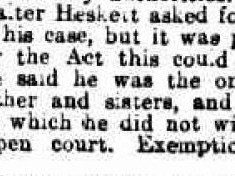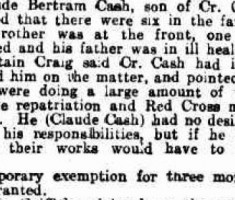By Cheryl Griffin.
On Wednesday 18 October 1916, just ten days before the first Conscription Referendum was held, 74 applications for exemption from military service were made before Police Magistrate Dr Frank Hobill Cole at Coburg Court. Thirty-four applications were granted, 31 were refused, five temporary or conditional exemptions were granted and four were adjourned. Six of those men were named in the next day’s edition of The Age.
Rollo Walter Heskett:
 ‘Coburg: Church Official as Conscientious Objector’ was in the Age, Thursday 19 October 1916, p.8.
‘Coburg: Church Official as Conscientious Objector’ was in the Age, Thursday 19 October 1916, p.8.
Twenty-three year old Rollo Heskett’s unsuccessful claim for exemption was based on his claim that he was the only support for his mother and sisters and had ‘other obligations which he did not wish to mention in open court’. He was the son of Walter Prosser Heskett, a native of Durham, England, and Emilie Rose. His father was a metallurgist who led a peripatetic life, moving his young family from place to place around the metropolitan area, country Victoria, New South Wales and Queensland. In 1906, when Rollo was thirteen, the family was living in Maryborough in Queensland. By 1914, Rollo, they were living at 44 Mayfield Street, Coburg. By then his father had left the family home and made his way to New Zealand where a son Brian was born to Walter Heskett and Kathleen Martin in 1915. Rollo’s father and second family eventually returned to England where his father died at Hampstead in 1925.
So, although his father was alive in October 1916, he was lost to his first family, who were to remain in Coburg for many years to come. Rollo, a clerk, could hardly claim to be the only support for his mother and sisters, however, as two other brothers lived at home, one a metallurgist and the other a clerk. Although exemption was refused, the records of the National Archives of Australia show that Rollo Heskett did not serve in World War One and until all applications to enlist are digitised, the reasons for this remain unknown.
Claude Bertram Cash:

Twenty-seven year old Claude Cash was the son of well-known Coburg resident, Cr. William Edward Cash. There were seven Cash children, four boys and three girls. The eldest son of the family, William, had drowned at Alexandra the previous December. The next oldest brother, Ernest, was a married man with children. He was an iron-worker who presumably did not work in the family business. Claude’s younger brother, Arthur Lancelot, a sign-writer, had enlisted in October 1915. Cash Plumbing was a thriving business, dealing mostly in sewerage pipes, sanitary ware and the like, so perhaps Claude really was needed at home. It is unlikely that his father was in ill-health, however, given that at this very time, Cr. Cash, himself a magistrate, was busy with his Council duties (Chairman of the Finance Committee, Council representative on the Board of Public Health) and chaired a number of enthusiastic and well patronised recruiting meetings.
It seems that Cr. Cash may have been the instigator of his son’s claim for exemption, as he states here that his civic and patriotic responsibilities were such that he would have to close his business if Claude were to join the military. Given that his eldest son, who worked in the business, had died the previous summer, and another son, Arthur, was away at the war, it is likely that this claim had some substance. The magistrate certainly thought so and granted a temporary exemption. The records show that Claude Cash did not serve, and he continued to work in the family business until his death in 1941.